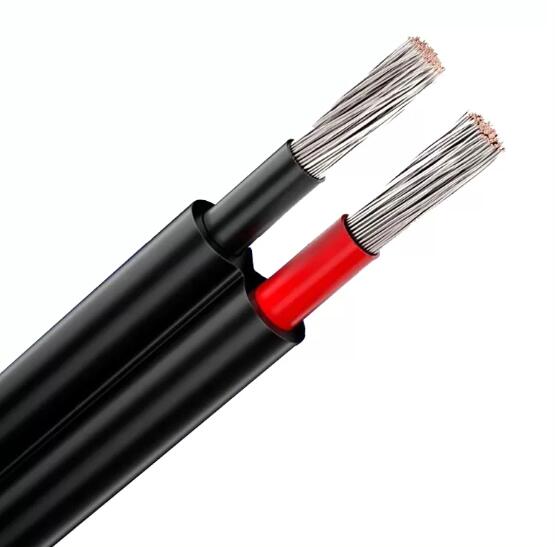- Home
- Products
- Certificates
- Cooperation
- About Us
- News
- Contact
Contact
Contact
Mar. 05, 2025
PVC solar cables are durable, flexible, and efficient, making them a good choice for solar power systems.
As the solar energy industry grows, selecting the right solar cables is crucial for ensuring efficiency, durability, and cost-effectiveness in photovoltaic (PV) installations. Among the various options available, PVC solar cables have emerged as a popular choice due to their affordability, flexibility, and electrical performance. This article explores the benefits of PVC solar cables from a manufacturer's perspective, integrating industry insights and key specifications to help procurement professionals make informed decisions.

PVC (Polyvinyl Chloride) is a widely used material for cable insulation and sheathing, offering a balance of electrical insulation, mechanical strength, and environmental resistance. PVC solar cables are specifically designed to withstand outdoor conditions while providing reliable power transmission in solar PV systems.
1. Cost-Effectiveness
One of the primary reasons manufacturers and procurement managers prefer PVC solar cables is their cost-effectiveness. Compared to other insulation materials such as cross-linked polyethylene (XLPE) or ethylene propylene rubber (EPR), PVC is more affordable without compromising essential performance requirements. The global solar cable market is expected to reach USD 2.5 billion by 2030, with PVC cables being a significant contributor due to their lower material costs and widespread availability.
2. Durability and Longevity
PVC solar cables are engineered to withstand various environmental factors, including UV radiation, moisture, and mechanical stress. Modern UV-resistant PVC solar cables offer enhanced durability, making them suitable for outdoor applications where prolonged sun exposure is a concern. Many high-quality PVC cables meet IEC 60332 flame retardancy standards, ensuring added safety in solar power systems.
3. Flexibility and Easy Installation
Unlike some rigid cable materials, PVC-insulated solar cables offer excellent flexibility, which simplifies installation, especially in complex PV system layouts. Their flexibility reduces the risk of damage during handling and allows for easier routing in confined spaces. This makes PVC solar cables for residential and commercial solar systems a preferred choice for installers looking for efficient and hassle-free cable management.
4. Electrical Efficiency and Safety
Manufacturers design high-performance PVC solar cables to provide excellent electrical conductivity and insulation. While copper remains the preferred conductor material, PVC insulation ensures minimal power loss and protects against short circuits. Many low-voltage PVC solar cables are rated for 600V to 1000V, making them ideal for most standard solar installations.
5. Compliance with Industry Standards
To guarantee reliability and safety, manufacturers ensure that PVC solar cables comply with international standards such as:
IEC 62930 & EN 50618 – Defines safety and performance criteria for solar cables.
UL 4703 – Ensures compliance with North American PV wiring requirements.
RoHS & REACH – Restricts hazardous substances for environmentally friendly solutions.
6. Resistance to Harsh Environmental Conditions
Solar PV systems are often exposed to extreme weather conditions, requiring cables that can withstand high and low temperatures. Weather-resistant PVC solar cables maintain their performance in temperatures ranging from -15°C to +70°C, making them suitable for diverse climate zones. Additionally, PVC sheathed solar cables resist chemicals, oils, and abrasion, enhancing their lifespan.
7. Versatility Across Solar Applications
PVC solar cables are widely used in various solar power applications, including:
Residential rooftop solar systems – Affordable and easy-to-install solutions for homeowners.
Commercial and industrial solar farms – Reliable power transmission for large-scale PV installations.
Off-grid solar systems – Durable and flexible wiring for remote solar projects.
Solar street lighting and EV charging stations – Supporting sustainable infrastructure.
When selecting a manufacturer for PVC solar cables, procurement professionals should consider:
Certifications and compliance – Ensuring adherence to IEC, UL, and TÜV standards.
Manufacturing quality control – Regular testing for electrical performance, UV resistance, and fire safety.
Customization options – Availability of different cable sizes, conductor materials, and sheath thicknesses.
Reputation and industry expertise – Partnering with experienced suppliers known for delivering high-quality solar cables.
PVC solar cables offer an optimal balance of affordability, durability, flexibility, and electrical performance, making them an excellent choice for various solar power applications. By selecting high-quality UV-resistant PVC solar cables, procurement managers can ensure long-term reliability and efficiency in PV systems. As the solar industry continues to expand, partnering with a reputable PVC solar cable manufacturer is crucial for meeting evolving energy demands and sustainability goals.
For inquiries about bulk orders, technical specifications, or custom PVC solar cable solutions, contact our expert team today.